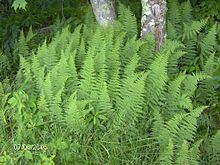Sitobolium punctilobulum, the eastern hayscented fern[4] or hay-scented fern, is a species of fern native to eastern North America, from Newfoundland west to Wisconsin and Arkansas, and south in the Appalachian Mountains to northern Alabama; it is most abundant in the east of its range, with only scattered populations in the west.[5] It is the sole species in genus Sitobolium.[2]
| Sitobolium | |
|---|---|

| |
| Scientific classification | |
| Kingdom: | Plantae |
| Clade: | Tracheophytes |
| Division: | Polypodiophyta |
| Class: | Polypodiopsida |
| Order: | Polypodiales |
| Family: | Dennstaedtiaceae |
| Genus: | Sitobolium Desv. (1827) |
| Species: | S. punctilobulum
|
| Binomial name | |
| Sitobolium punctilobulum (Michx.) Desv. (1827)
| |
| Synonyms[2][3] | |
|
Synonymy
| |
It is a deciduous fern with fronds growing to 40–100 cm (rarely 130 cm) tall and 10–30 cm broad; the fronds are bipinnate, with pinnatifid pinnules about three times as long as broad. It occurs in damp or dry acidic soils in woods or open woods, from sea level up to 1,200 m altitude.[5]
Sitobolium punctilobulum can exhibit varying degrees of phototropism. The common name "Hay-scented Fern" comes from the fact that crushing it produces an aroma of fresh hay.
The presence of Sitobolium punctilobulum influences the dynamics of the understory vegetation of many forests in the eastern United States. An abundance of Rubus allegheniensis in open areas encourages new tree seedlings. Where the effects of herbivorous animals (such as deer) reduce the abundance of Rubus allegheniensis, Sitobolium punctilobulum, which is not browsed by deer, takes over. Where Sitobolium punctilobulum becomes common, the growth of tree seedlings is restricted.[6]
It was first described as Nephrodium punctilobulum by André Michaux in 1803, and has been known by a variety of synonyms. Plants of the World Online accepts Sitobolium punctilobulum.[3]
References
edit- ^ "NatureServe Explorer 2.0 Dennstaedtia punctilobula Eastern Hay-scented Fern". explorer.natureserve.org.
- ^ a b Sitobolium Desv. Plants of the World Online. Retrieved 22 January 2024.
- ^ a b Sitobolium punctilobulum (Michx.) Desv. Plants of the World Online. Retrieved 22 January 2024.
- ^ NRCS. "Dennstaedtia punctilobula". PLANTS Database. United States Department of Agriculture (USDA). Retrieved 13 August 2016.
- ^ a b Nauman, Clifton E.; Evans, A. Murray (1993). "Dennstaedtia punctilobula". In Flora of North America Editorial Committee (ed.). Flora of North America. Flora of North America North of Mexico. Vol. 2. New York and Oxford: Oxford University Press.
- ^ Levin, Simon A., ed. (2009). "Wildlife Management". The Princeton Guide to Ecology. Princeton: Princeton University Press.
